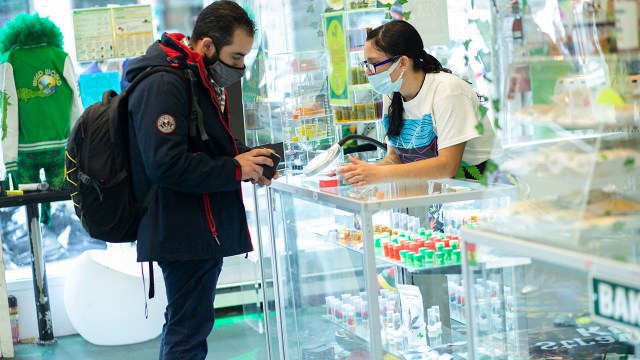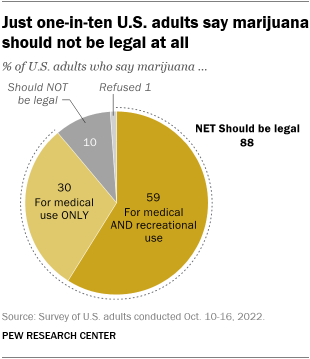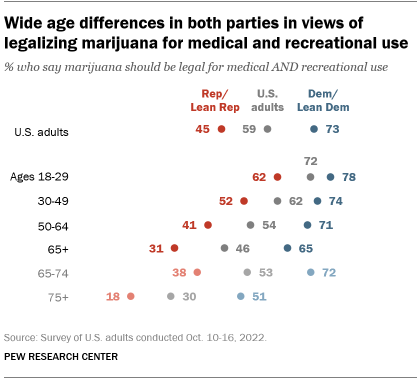
With a growing number of states authorizing the use of marijuana, the public continues to broadly favor legalization of the drug for medical and recreational purposes.

An overwhelming share of U.S. adults (88%) say either that marijuana should be legal for medical and recreational use by adults (59%) or that it should be legal for medical use only (30%). Just one-in-ten (10%) say marijuana use should not be legal, according to a Pew Research Center survey conducted Oct. 10-16, 2022. These views are virtually unchanged since April 2021.
The new survey follows President Joe Biden’s decision to pardon people convicted of marijuana possession at the federal level and direct his administration to review how marijuana is classified under federal law. It was fielded before the Nov. 8 midterm elections, when two states legalized the use of marijuana for recreational purposes – joining 19 states and the District of Columbia, which had already done so.
Pew Research Center asked this question to track public views about the legal status of marijuana. For this analysis, we surveyed 5,098 adults from Oct. 10-16, 2022. Everyone who took part in this survey is a member of the Center’s American Trends Panel (ATP), an online survey panel that is recruited through national, random sampling of residential addresses. This way nearly all U.S. adults have a chance of selection. The survey is weighted to be representative of the U.S. adult population by gender, race, ethnicity, partisan affiliation, education and other categories. Read more about the ATP’s methodology.
Here are the questions used for this report, along with responses, and its methodology.
Over the long term, there has been a steep rise in public support for marijuana legalization, as measured by a separate Gallup survey question that asks whether the use of marijuana should be made legal – without specifying whether it would be legalized for recreational or medical use. This year, 68% of adults say marijuana should be legal, matching the record-high support for legalization Gallup found in 2021.
There continue to be sizable age and partisan differences in Americans’ views about marijuana. While very small shares of adults of any age are completely opposed to the legalization of the drug, older adults are far less likely than younger ones to favor legalizing it for recreational purposes.
This is particularly the case among those ages 75 and older, just three-in-ten of whom say marijuana should be legal for both medical and recreational use. Larger shares in every other age group – including 53% of those ages 65 to 74 – say the drug should be legal for both medical and recreational use.

Republicans are more wary than Democrats about legalizing marijuana for recreational use: 45% of Republicans and Republican-leaning independents favor legalizing marijuana for both medical and recreational use, while an additional 39% say it should only be legal for medical use. By comparison, 73% of Democrats and Democratic leaners say marijuana should be legal for both medical and recreational use; an additional 21% say it should be legal for medical use only.
Ideological differences are evident within each party. About four-in-ten conservative Republicans (37%) say marijuana should be legal for medical and recreational use, compared with a 60% majority of moderate and liberal Republicans.
Nearly two-thirds of conservative and moderate Democrats (63%) say marijuana should be legal for medical and recreational use. An overwhelming majority of liberal Democrats (84%) say the same.
There also are racial and ethnic differences in views of legalizing marijuana. Roughly two-thirds of Black adults (68%) and six-in-ten White adults say marijuana should be legal for medical and recreational use, compared with smaller shares of Hispanic (49%) and Asian adults (48%).
Related: Clear majorities of Black Americans favor marijuana legalization, easing of criminal penalties
In both parties, views of marijuana legalization vary by age
While Republicans and Democrats differ greatly on whether marijuana should be legal for medial and recreational use, there are also age divides within each party.

A 62% majority of Republicans ages 18 to 29 favor making marijuana legal for medical and recreational use, compared with 52% of those ages 30 to 49. Roughly four-in-ten Republicans ages 50 to 64 (41%) and 65 to 74 (38%) say marijuana should be legal for both purposes, as do 18% of those 75 and older.
Still, wide majorities of Republicans in all age groups favor legalizing marijuana for medical use. Even among Republicans 65 and older, just 17% say marijuana use should not be legal even for medical purposes.
While majorities of Democrats across all age groups support legalizing marijuana for medical and recreational use, older Democrats are less likely to say this. About half of Democrats ages 75 and older (51%) say marijuana should be legal for medical or recreational purposes; larger shares of younger Democrats say the same. Still, only 8% of Democrats 75 and older think marijuana should not be legalized even for medical use – similar to the share of all other Democrats who say this.
Note: Here are the questions used for this report, along with responses, and its methodology.
